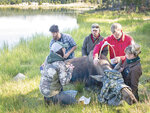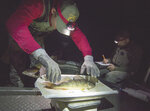Clear, 65° F
For the years since being cut off from the Legislature’s general fund, the Wyoming Game and Fish Department has been running relatively flat budgets, growing only slightly since 2017 at a time …
This item is available in full to subscribers.
The Powell Tribune has expanded its online content. To continue reading, you will need to either log in to your subscriber account, or purchase a subscription.
If you are a current print subscriber, you can set up a free web account by clicking here.
If you already have a web account, but need to reset it, you can do so by clicking here.
If you would like to purchase a subscription click here.
Please log in to continue |
|



For the years since being cut off from the Legislature’s general fund, the Wyoming Game and Fish Department has been running relatively flat budgets, growing only slightly since 2017 at a time that has seen additional expenses and rising costs for labor, equipment, fuel, housing and wildlife damage claims.
The Legislature basically asked the department to run as a business. But they weren’t given all the tools in the toolbox they would need to do so, according to Game and Fish Deputy Director of Internal Operations Eric Wiltanger.
“At that time, [the Legislature] gave us the approval to run like a business. But they didn't give us the ability to set fee increases or the ability to adjust for inflation,” he said in an interview with the Tribune.
The fiscal year 2025 preliminary budget shows attempts to pinch every penny, but those pennies have a limit on how thin they can get, he said.
“We definitely need more revenue, and new revenue. We've tightened the belt as much as we can,” he said, adding that deferring equipment purchases and maintenance can only go so far without putting the department at a disadvantage. “It's critical for our field folks.”
Without assistance from the General Fund, the department relies on licenses, tags and fees for about 85% of its budget. The other 15% comes through federal taxes on fishing and hunting equipment and grants. The proposed standard budget for 2025 is just over $102 million, up about 3% per year (22% total) since the department stopped receiving funding through the state’s General Fund, and well behind the rate of inflation — especially in labor costs, housing and vehicles.
Nobody can argue the past seven years haven’t been tough on budgets. Families, businesses and governmental agencies have all needed to learn to juggle post-COVID. Yet recent attempts to increase Game and Fish revenue streams have been denied by the stateLegislature.
This past session, a bill was proposed for an increase of about 10% for nonresident fishing licenses. The bill would have increased the non-resident daily, five-day, and annual fishing license fees from $12 to $14, $54 to $60, and $100 to $110, respectively and would have brought in a projected $673,000. However, the bill failed a vote for introduction by two votes, including a nay from Rachel Rodriguez-Williams (R-Cody), the only representative in the Powell area to vote against it.
During the previous session a bill was proposed to request an increase in non-resident fees for large game licenses, which would have brought Wyoming in line with other Western states. That too failed to pass, with both area senators Dan Laursen (R-Powell) and Tim French (R-Powell) voting no in the failed committee of the whole vote.
“In response to inflation; increased costs continue to limit the commission's ability to put dollars on the ground for wildlife and wildlife habitat. With these constraints, we continue to take a deeper dive into our budget and evaluate where our resources are applied,” said commission President Richard Ladwig. “Sportsperson user fees are the primary funding source for the department. The majority of these fees are set in Wyoming state statute, which the commission has no authority to modify.”
During the 2024 legislative interim session, the department's financial picture will be assessed to determine where there may be opportunities to generate additional revenue. Programs, infrastructure and current license fee structure are some of the intended areas to be assessed. In May, the department plans to talk financial planning to “hopefully educate everybody on kind of where things are at,” Wiltanger said.
Yet, recent responses by the Legislature to past bills suggest the prospects of additional revenue are slim.
“I wouldn't say we're at an impasse, but we are tight on our budget. So if [prices] continue to rise, just like everybody else we're going to take a hit. We're going to have to probably do less on the ground at some point, just to keep [the budget] flat,” he said.
The commissioners might now find themselves unable to respond to emergencies and special issues as they have in the past due to a shrinking discretionary fund, which is down about 65% from previous years. Some of those recent issues receiving emergency funding for the commission’s discretionary fund include migration corridors and predator control.
Discretionary funds are often allocated by the commission for two primary reasons. One is to address unanticipated expenditures, such as the increased costs it took to address the unprecedented winter experienced in 2023 in parts of the state and legislative increases to fund employee pay adjustments over the past two years. The other is to invest in high-priority projects. For example, extensive research specifically for mule deer over the past 10 years, new regional offices in Laramie and Cody, construction of employee housing in Teton County to ensure Game and Fish can maintain a presence there, and the construction of a warm and cool water hatchery at the Speas facility in Casper to mitigate the risk of invasive species introduction and disease.
The preliminary budget for next year shows large cost saving attempts by department actuaries, but seemingly temporary bandages. For example, the department intends to take a year off from its typical maintenance and replacement plan for employee housing (other than the Jackson housing project, which received full appropriation in the FY24 budget).
The department has more than 100 houses for employees, such as game warden housing, the two bird farms, 10 hatcheries and Sybille Wildlife Research Center. Game and Fish plans to do a study this coming year to better schedule for future needs, Wiltanger said. But taking the year off will also save nearly $1 million in fiscal year 2025.
“With the price of everything, and especially the price of housing, to go in and buy a $200,000 house is unheard of anymore. And it doesn't matter what community in Wyoming you're looking at,” he said.
The department will also save nearly $400,000 from purchasing fewer vehicles and by assessing the actual need for employees who aren’t always in need of the mighty, green, three-quarter and one-half ton trucks common to those who travel off-road. They also plan to defer some maintenance.
“It's the operating and maintenance cost on vehicles that has gone up more substantially,” said department Chief Financial Officer Meredith Wood.
Despite the savings, it’s somewhat risky to prolong vehicle purchases due to that financial sweet zone between trade-in value and increased maintenance costs, Wood said.